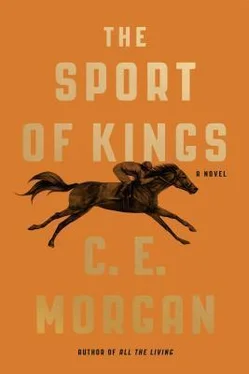“Henrietta,” her mother called, then gave chase, so the girl heard those staccato cracks on the wood floors, a sound that somehow seemed to perfectly match the woman herself. The sound caught her in the kitchen. Judith gripped her shoulders from behind and then, with real force, turned her around and pulled her to her body. The girl felt her shivering with a sorrow that came in little waves. Then Judith reached down and took her face tightly in her pale, skinny hands.
“Henrietta, this isn’t selfishness—”
“Please don’t go.”
“—it’s survival.”
“Stay,” Henrietta whispered.
Her mother’s eyes bored into her. “Can you even remember the good times?”
Henrietta’s mind fumbled for the right answer.
“See?” came her mother’s strained but triumphant whisper. “Neither can I.”
* * *
“Henrietta!”
“Henrietta!”
He found her slumping down the stairs from the attic, where she’d spent hours curled on an old linen-draped divan, surrounded by the boxed and labeled artifacts of her ancestors’ lives. They stank of mothballs and of lives extinguished.
His grip on her shoulders stopped her short. “Henrietta, have you been in the attic? I’ve been looking everywhere.”
She tried to look him in the face, but it was too much to bear. There was a strange, fresh exuberance there, something overly bright, a mania impelled by grief. It was like a door swinging open wildly on one hinge.
“Mom went away?” was all she could choke out. Downstairs, as if in affirmation, the tall clock chimed for two.
Now, Henrietta, see how you are swept against your father, the air crushed from your lungs? Head torqued to the side, you are confronted with a yellow wall and two portraits of men who bear your noble nose, the fine cut of your cheekbones, your eternal eyes. Every corner of the house is filled with the purpose of your father’s life. Which is … you … or a horse.
“Please make Mom stay,” Henrietta blurted.
“I can’t.” She felt his exhalation on the top of her head.
“Why not?”
It took him an eon to reply. “I take responsibility for this, Henrietta,” and once again with both hands to her shoulders, he drew back to peer into her wrenched face. “In so many respects, I chose poorly. I was so … It reminds me of something my father once said — a damaged beauty is the only kind of beauty capable of gratitude. But when I met your mother, I was too young and easily impressed by her … conformation to really understand the truth in what my father said. To be honest, I probably didn’t believe him.” He laughed wryly. “If I’d been wise like Boone … do you remember me telling you how Boone chose Rebecca?”
Now it was Henrietta who pulled away; she didn’t want a story, a history, a textbook.
Henry hooked a finger under the strong bone of her jaw and raised her chin. “When he decided to court her, he took her out to an orchard, where they could sit in the grass and get to know each other. While they sat there talking, Boone started to toss his knife into the ground, blade first. But this wasn’t just absent-minded fiddling. He was testing Rebecca to see how she would react. Again and again, he drove the knife into the ground closer and closer until it was in the fabric of her skirt and almost slicing her thigh. Rebecca saw what he was doing, but she didn’t run, she didn’t tell him to stop, she never even said a word. And that’s how Boone knew he had found the right woman. A woman who doesn’t flinch is one in a million.”
Henrietta stared straight at the pearl buttons on his shirt, bewildered and barely listening. I am a hybrid seed. A parent form has disappeared from the record. She tried to translate this into a configuration another person would understand. “I want my whole entire family,” she said, her eyes filling with tears.
“You and I are family,” Henry said with too much force. “Blood and treasure. Listen to me, Henrietta. I created this world with my own two hands, and I am going to leave it all to you — the acreage, the buildings, the horses, everything. It’s lying in trust for you, because you are my real family. And when you have children, all of this will be theirs in turn. Everything you need is already in this house.” That old music again, his dark, fathomless pupils a spinning record, playing the old refrain, playing It.
“Tell me your great-great-great-great-great-great-grandfather’s name,” he said, staring into her eyes.
“Daddy—”
“Tell me.”
“Samuel Forge.”
“Samuel Henry Forge and Edward Cooper Forge and Richmond Cooper Forge and William Iver Forge and Moses Cooper Forge and Jacob Ellison Forge and your grandfather, John Henry Forge, and me, Henry Forge. And now you. You. You —”
“I know,” she said to interrupt him, her mouth trembling. “But I’m a girl.”
“Well, then you won’t be like any other girl,” he said, his voice suddenly sharp. “I won’t let you.”
* * *
She needed a girl to stand behind her in the looking glass, to part her reddish hair down the middle and scrape it over her ears into a bun coiled through with black ribbon and covered with a square of black lace; to ease her grieving limbs into white cotton drawers and a long chemise; to snap her stockings into garters and cinch up a corset until it was too tight for her to draw breath, much less cry; to secure the caging crinoline; to tug over her head a dress of flat black, strangling at the neck but with sleeves like church bells; to slip her feet into black boots so she could totter here and there, tapping out unspoken grief on the plank floors in the long-lost code of broken women; but she didn’t have twenty yards of black Parisian cotton or a veil or a colored girl, and, alas, people would say this wasn’t a death, just a divorce, but they were all mistaken, because it was a difference of degree, not of kind. The pain was almost the same. And because she didn’t have that girl to rail against, to beat about the head and shoulders, because there was no one weaker, she flung her black bonnet against the walls of her mind and clattered about like a drunkard and wailed at the vaporous absent bitches hate sonofabitchspoilevilrottenfuckfuckniggers, because there was no one else around smaller and weaker than she was—
For example:
Class, what is the capital of Kentucky?
Frankfort.
And who works hardest for Kentucky’s economy?
Horses.
And who built our world-famous limestone fences?
Niggers.
Mrs. Garrett, after her face righted itself, spun Henrietta out of the classroom like a top, spun her round so quick she felt bile rising in her throat, standing there unsteady in the nauseating green hallway — green as a swimming pool — her head swooning back against the cool tiles as her teacher towered over her, leaning in so close that Henrietta could smell the tuna from lunch on her breath as she said, “There is only one appropriate word for a black person that begins with an n , and it has one g , not two. Young lady, do you understand what I’m saying?”
“A river in Africa?” the girl said.
Mrs. Garrett just stared at her for a moment with an anger so righteous and consuming, it was almost erotic, peering first into one pupil and then the other, as if trying to discover which eye was the source of this evil. She said, “First of all, the walls were built by Irish stonemasons. Second of all, if I had one black student, I’d be marching you back in there to apologize. But seeing as there are none, I’m sending you home straightaway, because I’ve had enough of your attitude. Believe me when I say that I’ll be speaking with your parents.”
“Incorrect usage,” Henrietta said.
Читать дальше
Конец ознакомительного отрывка
Купить книгу












